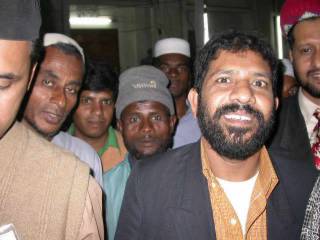
Bangladesh Ahmadi Muslims
Love For All, Hatred For None
By Kazi Anwarul Masud
Should the world dread the possibility of the rise of religious intolerance? Should we read into the Bush victory a not so insignificant role played by the Christian Right which appears to have blended well with the prominent shade of the Republican Party's conservative wing epitomizing the values of economic individualism, Social Darwinism, and nationalism?
Historian Bernard Lewis and his critical essays on Islam are read with messianic devotion. Samuel Huntington, credited with providing a credible explanation of global turbulence in terms of clash of civilizations, is now being adulated as a great native son for his enquiry into the hybridization of the US mainland due to the "invasion and settlement" of large number of Spanish speaking people from the south whose language and culture are distinct from those of mainstream Americans.
Transnationalism, an inevitable phenomenon of globalization, is now treated with suspicion in the West despite having the power to define, in the words of Ziauddin Sardar, "freedom, progress and civil behavior, law, tradition and community; what is real and what it means to be human. The non-western civilizations have simply to accept these definitions or be defined out of existence."
This phobic suspicion of anything remotely different from the core politico-cultural practices is of course a result of 9/11, but now translated as intrusion into the privacy of groups of people, citizens and aliens alike, totally repugnant to the liberal values hitherto espoused and practiced by the West.
This intrusion has been particularly pre-eminent in the lives of people practicing religions not followed by the majority in the West. Scholars have generally believed that religions have too often been used to "justify the violation of human rights, in part through the hierarchical and selective use of role ethics and postponement of temporal justice to divine judgment."
It has been argued that the ethic of reciprocity demands religious tolerance. In Christianity, for example, the concept has been defined in one of the gospels as: "Therefore all things ye would that men should do to you, do ye even so to them."
If a Christian considers his religious ethic of reciprocity is of paramount importance, then he would want people of other beliefs to enjoy freedom of religion, speech, assembly, and other freedoms enumerated for example, in the UN Universal Declaration of Human Rights and other documents.
However, it is to be acknowledged that religious freedom is one of the most complicated matters in the whole of human rights law and practice. It comprises an assortment of related rights and entitlements such as freedom from discrimination because of one's religion, freedom to live in a society that does not give preference to any particular religion over others, and freedom to enjoy civic respect for one's religion.
Thomas Hobbes, who was one of the first modern Western thinkers to provide secular justification of the state that marked a departure in English philosophy from the religious emphasis of scholasticism, observed that people being fearful and predatory must submit to the absolute supremacy of the state in both secular and religious matters for self-preservation.
Since the world we live in is far from the Kantian world federation of perpetual peace, where actions of any sort are neither taken from a sense of duty nor dictated by reason and often are performed for expediency, absolute freedom of speech and expression on religious matters had to be circumscribed at that time in history.
Thus in the British criminal law the crime of blasphemous libel was developed mainly during the 18th century to protect the Anglican version of Christianity but exempted other religion or beliefs. That is why the British court did not entertain a blasphemy case leveled by British Muslims against Salman Rushdie for his The Satanic Verses because Rushdie's irreverence was not recognized as a crime in British law.
Are to assume that the Western paranoid suspicion has come to such a stage where the decimation of the Taliban (albeit totally justifiable), the removal of Saddam Hussein, and the current debate on taming the Iranians would not be enough to safeguard not only the Western way of life but also their religion?
That it might be necessary to invoke inquisitional methods including implementing blasphemy laws where they exist and legislating such laws where they do not? According to Black's Law Dictionary blasphemy is "any oral or written reproach maliciously cast upon God, His name, attributes or religion.
In general blasphemy described as consisting in speaking evil of the Deity with impious purpose to derogate from the divine majesty and to alienate the minds of others from love and reverence of God."
Though blasphemy law in England was enacted to protect the Anglican version of Christianity, its application has been rare. Americans too feel uncomfortable by the idea of punishing someone for blasphemy. It runs counter to the freedom of religion and freedom of expression, both guaranteed in the First Amendment of the US Constitution.
The US Supreme Court never had to decide on a blasphemy case. But in 1952 it ruled on a similar matter. Justice Tom Clark observed: "It is not the business of government in our nation to suppress real or imagined attacks upon particular religious doctrine." Gradually, state courts found prosecution of blasphemy cases unconstitutional or unenforceable. No prosecution for blasphemy has taken place in the US since 1971.
It would perhaps be instructive if the impact of blasphemy laws in neighboring countries were discussed. In the Indian sub-continent the British enacted the blasphemy laws to protect minority Muslims from possible attacks from majority Hindus.
After the creation of Pakistan, as the Muslims became the majority community there was no reason to keep the laws in the statute book. But instead of abolition, the laws were made more stringent. Legislation undertaken during 1980-1991 (life imprisonment was replaced by mandatory death penalty) made the Muslims more intolerant towards non-Muslims.
From 1948-79 eleven cases of blasphemy were registered. Only three cases of blasphemy were reported during 1979-86. Forty-four were filed during 1987-99. In 2000 fifty-two cases were registered out of which forty-three were against Muslims and nine were against non-Muslims.
This shows that the Muslims against fellow Muslims to settle old scores are abusing the laws more blatantly. Jurists have raised questions as to whether a non-Muslim can be sentenced to death as he is already a "kafir" (non-believer) and not a "murtad" (a person who repudiates Islam after embracing it).
Without delving into the complexities of the Islamic laws on this issue, one can safely make the observation that the blasphemy laws and their stringent applications have not raised the image of Pakistan in the world as a tolerant Muslim country. The UN Commission on Human Rights, referring to Pakistani blasphemy laws, observed: "When religious discrimination is inscribed in laws and imbedded in societal structures, this often lads to victimisation of minorities as well as killings and assassinations."
The UN Commission reminded Pakistan that the laws over the years have resulted in religious intolerance and violence against Christians, Hindus and members of the Ahmadiyya community.
The commission further reminded Pakistan of the Catholic Bishops Conference of Pakistan which held that the mere use of the laws was an abuse since the laws were inherently bad legislation, the language of the laws were ambiguous, the objectives were dubious, and the laws lacked the protection of guarantee against misuse.
The UN Commission called upon Pakistan to repeal all discriminatory laws including the blasphemy laws and ratify human rights treaties that it has not yet ratified.
We in Bangladesh should be cautious about the dangers of religious extremism in view of the on-going agitation by an extremist Islamic group to declare the Ahmadiyyas in Bangladesh as non-Muslims. Amnesty International head Irene Khan has expressed her grave concern over this continuing agitation.
She reportedly viewed Bangladesh as a fractured society, one group trying to adorn the country with democracy and modernity while the other in bent upon taking the country along the path of religious intolerance.
Our caution needs to be redoubled due to the mistaken belief in some parts of the West that the convulsions in the Islamic world are because of its intolerance of the House of the Unbelief -- Christendom -- a competing world religion and a distinct civilization; little realizing that the convulsions could have been caused by the struggle between monotheistic Islamists and the moderate Muslim elements to capture the soul of the Islamic world.
It would, therefore, be unwise to give the impression that there is an incipient movement of neo-Islamic conservatives at a time when the world is experiencing raging turbulence of clash of civilizations. We have to continue our efforts to convince the world that an acceptable level of religious freedom exists in Bangladesh.
Kazi Anwarul Masud is a former Bangladesh Secretary and Ambassador.
The Daily Star, Sunday, November 28, 2004










